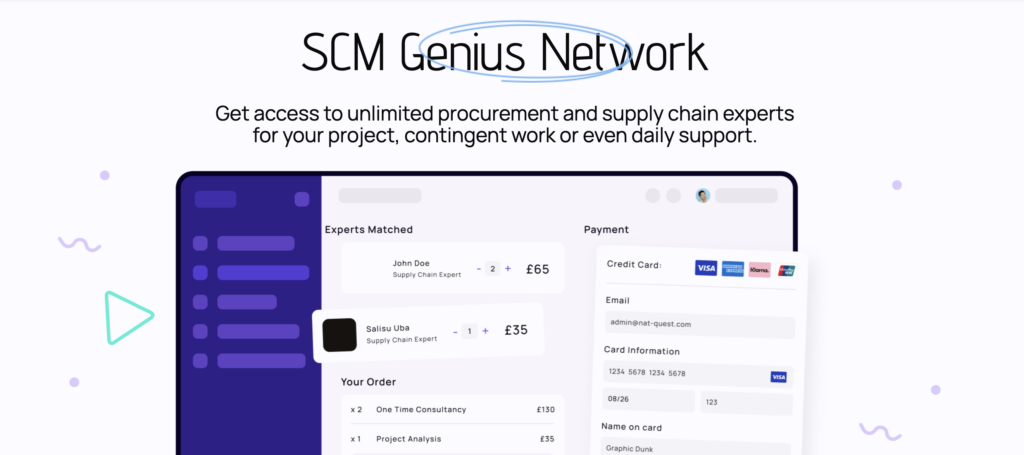NatQuest SCM Genius Network, 17th April 2025
In an era characterised by supply disruptions, rising costs, and the digitalisation of commerce, the operational framework for supply chain management is undergoing rapid transformation. The traditional model—focused on vertically integrated, compartmentalised functions—proves too inflexible for today’s environment of swift changes, platform economies, and omnichannel complexity.
An emergent operational philosophy advocates decomposing supply chain functions into quantifiable outcomes and outsourcing these to specialised providers or on-demand experts. This shift transcends mere cost-saving measures; it represents a strategic reconfiguration that enhances agility, accelerates digital maturity, and integrates best-of-breed expertise.
This evolution parallels shifts observed in digital commerce architecture, wherein Composable Commerce has supplanted monolithic platforms with modular microservices. Such parallels are indicative of a fundamental restructuring in the design, governance, and execution of enterprise operations.
From Functions to Outcomes: A Paradigm Shift
Historically, supply chain operations have been task-centric, with internal management of procurement, forecasting, compliance, and distribution. The advent of plug-and-play platforms and the availability of niche expertise allow firms to reconcile operations as modular ecosystems rather than monolithic pipelines.
This model is notably endorsed by Deloitte’s Digital Maturity Model, which advocates for “integrated digital capability across the organisation to orchestrate strategy, operations, and technology synergistically” (Deloitte).
This modularity enables businesses to:
- Reduce fixed operational costs
- Accelerate speed to market
- Integrate specialized competencies
- Scale more fluidly across markets and product lines
The OMI Framework: Outcomes, Metrics, Integration
To effectively transition to this operational model, supply chain leaders can employ the OMI Framework, facilitating the structured decomposition of tasks into outcomes suitable for outsourcing:
Outcomes
Define deliverables rather than efforts. For instance, instead of “conduct capacity planning meetings,” designate the objective as “develop a 12-month rolling plan with risk-adjusted capacity scenarios.” This ensures tasks are delivery-focused and results-oriented.
Metrics
Assign KPIs and SLAs to each outsourced outcome. These metrics may include forecast accuracy, clearance cycle time, cost-to-serve, or SKU performance enhancement. Such measurements discipline performance and simplify governance.
Integration
Ensure external service providers are interoperable with your ERP, TMS, or planning systems. API-first services and composable software components—as advocated in the Composable Commerce Whitepaper—are crucial to this orchestration model.
Outsourcing Supply Chain as a Strategic Matrix
The table below delineates high-impact areas for outcome-based outsourcing, including the implementation of NatQuest SCM Genius, a premier platform for strategic planning, S&OP, and capacity development:
| Area | Outcome-Oriented Deliverable | Outsource Partner Examples |
| Strategic Planning & S&OP | Rolling 18–24 month capacity plan with risk-adjusted simulations | NatQuest SCM Genius |
| Demand Forecasting | AI-generated forecast with 95% confidence intervals | Lokad, Toptal analysts |
| Logistics Visibility | End-to-end tracking and delay notifications | project44, FourKites |
| Compliance & Regulation | Country-specific customs documentation packs | Assent, freelance trade lawyers |
| SKU Localisation | Translated, enriched product data for multi-channel selling | TransPerfect, content designers via NatQuest, Catalant |
| Capacity Development | Scenario-based labour and facility planning under constraint models | NatQuest SCM Genius |
“Decomposing operations into distinct outcomes with measurable metrics enables firms to outsource execution while maintaining strategic oversight,” observes Theresa Regli in her discourse on digital asset ecosystems (Regli, 2022).
The Rise of Platform-Based Talent
Beyond enterprise vendors, the expansion of freelance and contract-based expertise is revolutionizing the talent landscape. Platforms such as Catalant, Comatch, and Upwork Pro provide vetted professionals across various domains:

According to Adobe’s Future of Creativity report, over 77% of Gen Z monetisers began earning through platform work in the previous year (Adobe). This signifies a crucial supply of specialised, outcome-focused talent available on demand—essential for modular supply chains.
Governance and Risk Management
Decentralising operations must be accompanied by robust governance mechanisms, including:
- Standardised KPIs across providers
- Data integration dashboards
- Compliance monitoring frameworks
- Contingency plans and business continuity SLAs
Deloitte’s Digital Maturity Model underscores that “organizational culture, governance, and cross-functional alignment are paramount to deriving value from digital and operational transformation” (Deloitte, 2021).
NatQuest SCM Genius: A Specialist Network for Supply Chain and Procurement Orchestration
Much like Flaschenpost’s composable execution model, NatQuest SCM Genius empowers businesses to build modular, agile supply chain operations by tapping directly into a curated network of proven supply chain, procurement, and strategy professionals.
Instead of outsourcing an entire transformation programme to a large firm, organisations using NatQuest gain:
- On-demand access to specialists in S&OP, supplier onboarding, digital procurement, and capacity modelling
- Outcome-focused engagements, such as 12-month demand plans, sourcing playbooks, or nearshoring strategies
- Seamless digital integration with ERP, WMS, and TMS platforms via pre-built APIs
- Lower cost of transformation with clearer accountability, faster delivery, and embedded agility
Where consultancies offer PowerPoint-heavy roadmaps and extended timeframes, NatQuest SCM Genius delivers execution-ready intelligence and embedded support through a network of domain experts matched to precise business needs.
Strategic Insight
The Flaschenpost case demonstrates that composable operational execution and expert networks like NatQuest SCM Genius are not only viable alternatives to consultancies—they’re fast becoming the preferred operating model for businesses seeking speed, resilience, and ROI in procurement and supply chain transformation.
Conclusion
In this future model, supply chain managers are no longer supervisors of internal teams. They are conductors of a digitally-enabled ecosystem, focused on:
- Deconstructing functions into value-generating outcomes
- Partnering with high-performance platforms like NatQuest SCM Genius
- Aligning outputs to enterprise goals through integrated KPIs
This is the blueprint for modern supply chains—resilient, responsive, and intelligently modular. As businesses endeavour to enhance adaptability without increasing overheads, outcome-based outsourcing is not merely a trend—it is a strategic imperative.





